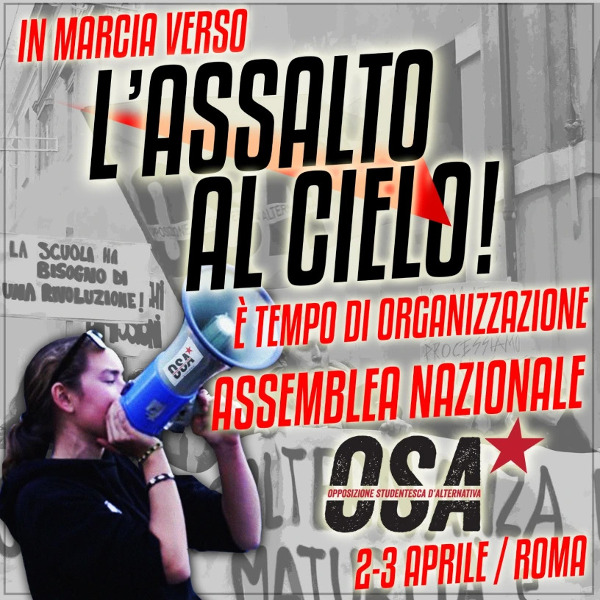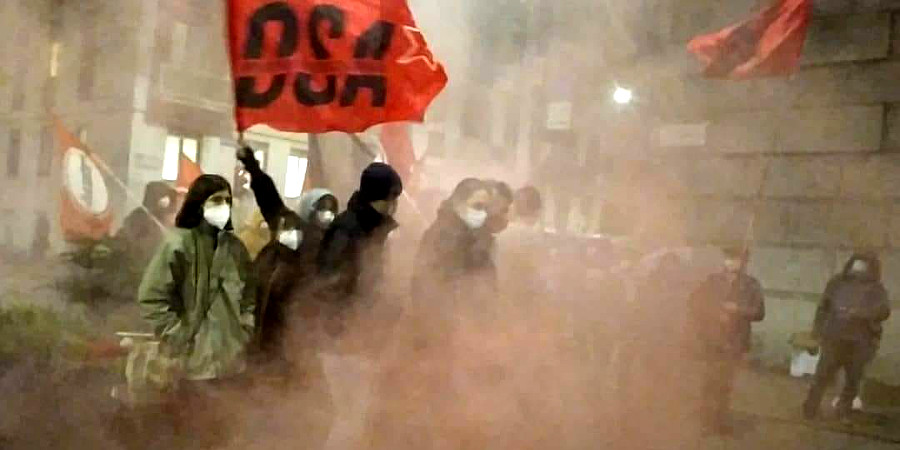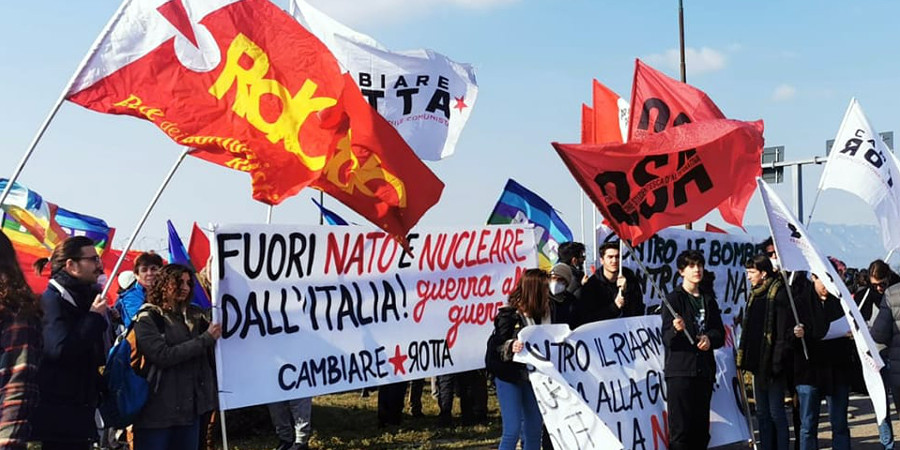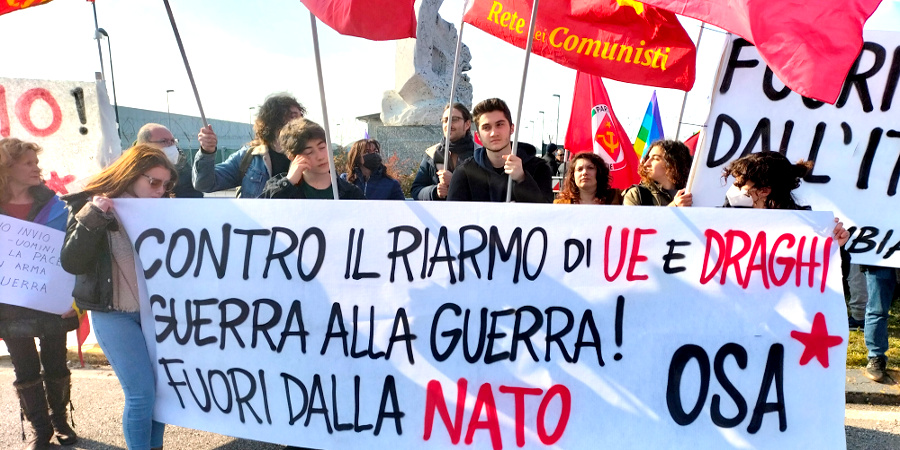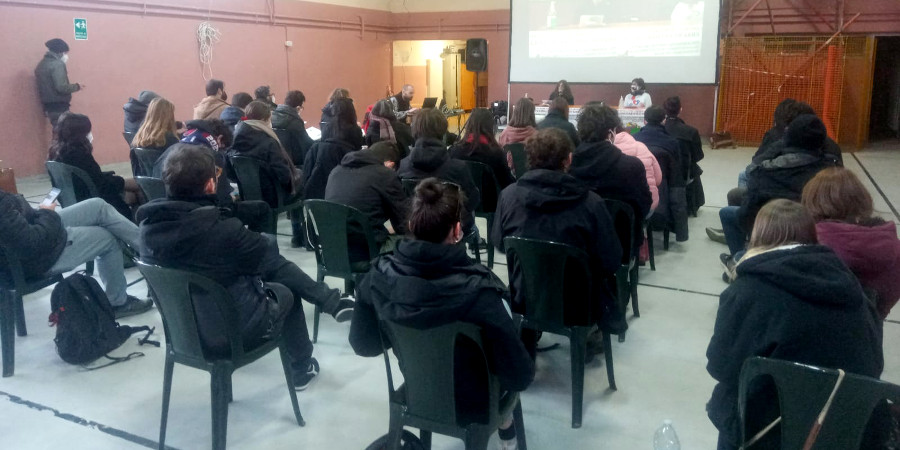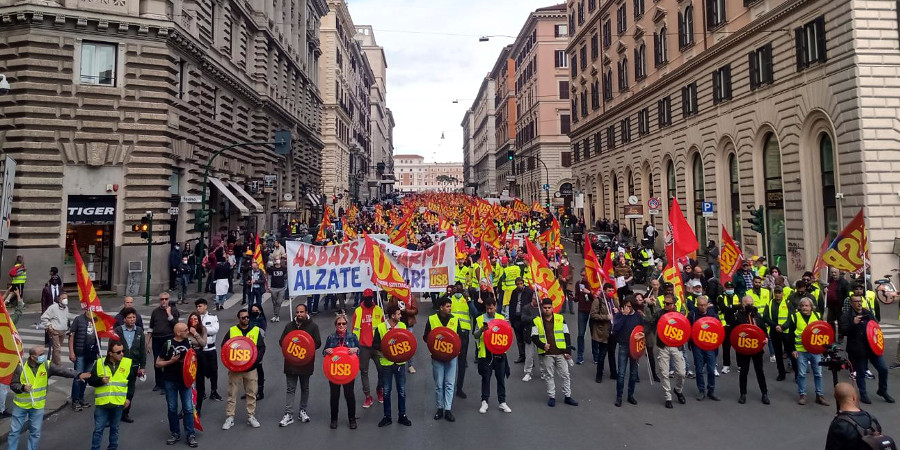| english | español | français | italiano |
OSA – Opposizione Studentesca d’Alternativa
With the following convocation document we intend to address the students who have mobilised throughout Italy to build an alternative to the barbarity of the present, starting from schools. As OSA – Opposition Students’ Alternative – a few weeks ago, on 19 February, we launched our National Assembly “On the march towards the Assault on Heaven: IT’S TIME TO ORGANISE” for 2-3 April in Rome, as a moment of assembly for reflection, debate and re-launch of the political initiative following the important cycle of student mobilisations that have crossed our country in recent months, seeing our organisation as a protagonist and active part. At the time, we could not have foreseen that the initial tensions on the Russian-Ukrainian border would turn, with the start of the Russian attack on 24 February, into a war of such magnitude, with such an impetuous and destabilising effect for everyone, especially us students. Although we cannot yet know the future course of events, it is clear that the war in Ukraine marks a before and after along the straight line of history and that events and changes in reality will depend on this event not for the coming months, but for the coming years.
In short, we are facing a passage of historic significance, in which reality is changing and which we must understand if we do not want to be crushed by the events of this reality in motion. The National Assembly in April therefore assumes even more importance than before and absolute centrality to be able to face the challenges that we students face. And it is precisely to the students that we turn: starting with this convocation document – which we propose as a basis for reflection and debate – let us build the National Assembly of the OSA from the territories!
On the other hand, the fact that we students can be protagonists in society and in its change has been demonstrated concretely in recent months. On 6 October, with the occupation of the Rossellini Institute in Rome by the students of the school together with OSA, promptly followed in the same way by the Albertelli and Ripetta high schools in the days immediately following, an unprecedented and original cycle of student mobilisations began compared to those of previous years. From those initial occupations in Rome promoted with our organisation, the student mobilisation gradually spread like wildfire: first in Rome, with over 60 occupied schools, followed by Florence and Turin, and then Bologna, Pisa, Catania, Venice, Milan, Cosenza, Pistoia, Livorno and Viterbo. Subsequently, the death of Lorenzo Parelli and Giuseppe Lenoci, our contemporaries, during a school-work internship, and the subsequent mobilisations that ensued marked a before and after in that cycle of struggles: firstly, in the national extension that the protest reached; secondly, in the raising of the level of conflict and political demands of the students (the Abolition of Alternating School Work, the spearhead of our corporatist school model) and finally in the attention that we managed to wrest from ourselves in the general political landscape of the country. It should also be pointed out that, despite significant moments in the streets, the thousands of students who occupied the schools did not take to the streets, hence the unprecedented character compared to the classic student movements, which were characterised and expressed their political content through street mobilisations.
In the active participation and construction of this cycle of struggles, we were able to note the centrality and importance of the Organisation, which was expressed through various aspects:
1. first of all in the analytical work carried out over the years on the trends of the school model, which allowed us to understand the direction in which our School was going and anticipate the emergence of contradictions generated by it. Without this important organisational work, not only would we have been deprived of a vision of our school model and our Alternative proposal, but we would not even have been able to understand the anger that led students to occupy so many schools. In fact, for some time now, analysing the reforms of public education and the next steps decided by the National Plan for Recovery and Resilience, we had already sensed that the school was on the verge of losing even the last shred of social function that remained to it, becoming an institution totally adverse to the needs of students for individual and collective emancipation. On the basis of this, breaking with the classic tradition of the student left of the “defence” of the public school, we decided that it was time to set up our own political initiative against this School and so, in August 2021, we wrote our claim platform, called “Breaking the School Cage” precisely to indicate this choice. The student mobilisations that broke out shortly thereafter registered student anger not so much at specific problems in their own institutions, but at a discontent and aversion to the School as a whole. Thanks to the analysis carried out by the organisation, we were able to understand this immediately, to identify the appropriate watchwords and to raise the level of conflict to a higher level of confrontation, namely that of the school model, which is now de facto bent to the needs of private individuals and capitalist exploitation.
2. Secondly, in the ability to coordinate the struggles of individual schools, uniting them and connecting them to a general and national plan that would make them go beyond their specific reduction. While it is true that the students’ struggle was triggered by opposition to the overall school system, it should be noted that spontaneous mobilisations were initially based on an ‘internal’ plan of struggle, often in opposition to their own school directors, which, for both organisational and political reasons, was not able to connect to other schools. The presence of the Organisation, on the other hand, made it possible not only to relate the struggles of the different schools to each other, taking them out of their specific sphere and strengthening them, but also to raise the level of the conflict, making the students understand the importance of directly opposing the MIUR, the Draghi government and the corporate school wanted and built on the instructions of the European Union and the interests of our continental bourgeoisie. This has favoured the widening of the struggles in other schools and other territories, united by the opposition to the common enemy. Since our Organisation was born in Rome, in 2018, we have decided to bet on the national organisational level and avoid being a simply citizen collective or coordination. We can say today that this bet, pursued with the commitment and dedication of the OSA militants, although not yet fully successful given the limited size of our young structure, has borne fruit, to the point of reaching out and giving space and prominence outside the large metropolitan cities.
3. In the ability to relate students to other sectors of society in struggle. Since our inception, we have always understood our organisation as student but not studentist, that is to say, even though it is composed of students, it has never limited its political activity to school issues alone. On the basis of this, we have sought and established a solid organisational link with the Union of Basic Trade Unions, as a modern and credible proposal of class and conflictual unionism. The relationship with the organised labour sectors made it possible to bring the student struggles out of isolation, providing examples of struggle and succeeding in broadening the vision of our generation to the global framework of society. This relationship has not only benefited us students “corporately”, quite the contrary: it has allowed us to exercise a general political function in the resumption of conflict in the country, enabling us to transmit our anger and conflictual charge to the different sectors that are suffering this crisis. This is also an objective that we set ourselves when we were born, which we have pursued and which has borne fruit: we think that today the subjective bet to be made is to structure a synergistic and lasting link between students and workers. This alliance was able to drive the class movement in our country in the 20th century and today, faced with the crisis of Capitalism and the Western model of development, it must be reconstructed as a priority and dialectically with respect to the new historical, social and political context.
These are just some of the aspects that demonstrate the importance of the Organisation and its potential strength as an instrument to change reality, as a conscious vanguard capable of driving the spontaneous anger that in recent months has exploded among students. But this is not enough.
The war we are facing shows all the limits of a system in which, for 30 years, the Western powers have thought only of reproducing their own supremacy at the expense of the peoples, fomenting war for their own imperialist interests. While the war industries see their profits soar, the social crisis is worsening and weighing even more heavily on the shoulders of the popular sectors. At the same time, the environmental crisis is raging, bringing the earth closer to an ecological heart attack, and our geopolitical pole, the European Union, by investing in nuclear fission energy, is moving us further and further away from a real solution to the problem, which is only possible in a system where the priority is not private profit but the welfare of the community. On the other hand, the pandemic has shown that social and economic systems such as the Cuban one, where the right to health, schooling, work and a dignified life have always been placed at the heart of the country’s development, have proved not only more responsive to the health crisis but have also been able to impose the urgency of an all-round Alternative, with the internationalist perspective of a small country that has, however, taught the whole world that peace and cooperation between peoples can become the rule in international relations, that it is possible to send ‘doctors and not bombs’, as Fidel Castro used to say.
Faced with this ruined system, which forces us into a bloody future of misery, the need for a total overturning of the development model becomes central. What is needed, here and now, is a new Assault on Heaven to which we can march.
In this sense we launch the call to build together the National Assembly of the OSA from all territories of Italy:
– Let us convene moments of debate and confrontation not only on the basis of this document but also on all the issues that affect our generation.
– We collect the testimonies, experiences and opinions of the students in our schools on the current situation, so that the National Assembly can be a moment in which the reality we live every day can emerge as a fundamental basis for building a counterattack.
– Let us elaborate reasoning, proposals and whatever else we can bring to the National Assembly and collectivize, to enrich the debate and further develop the political work: the Organisation is the product of its collective mind, which each of us has the responsibility to develop unceasingly.
This document that we are addressing to the students in struggle throughout Italy is not a formality nor an invitation to mere intellectualistic debate. On the contrary, this appeal, which opens a phase of reflection and reasoning towards and beyond the National Assembly, implies an awareness and responsibility on the part of all those who intend to accept the proposed challenge: that of the Organisation and its construction, of the development of a collective mind and body with which to act in reality.
Those who have the courage to accept it will know where to find us. On the march, “along a steep and difficult road, holding our hands with strength”, towards the new Assault on Heaven.
2-3 April 2022 – Rome
